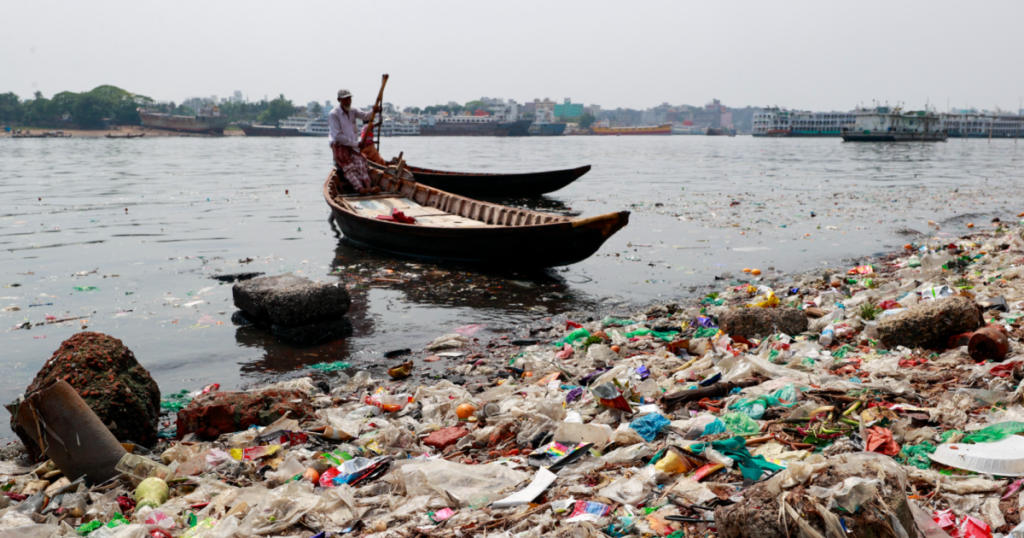River Buriganga, in Dhaka, Bangladesh.Suvra Kanti Das/Zuma Press
This story was originally published by the Guardian and is reproduced here as part of the Climate Desk collaboration.
Oil and chemical companies who created a high-profile alliance to end plastic pollution have produced 1,000 times more new plastic in five years than the waste they diverted from the environment, according to new data obtained by Greenpeace.
The Alliance to End Plastic Waste (AEPW) was set up in 2019 by a group of companies which include ExxonMobil, Dow, Shell, TotalEnergies, and ChevronPhillips, some of the world’s biggest producers of plastic. They promised to divert 15 million metric tons of plastic waste from the environment in five years to the end of 2023, by improving collection and recycling, and creating a circular economy.
Documents from a PR company that were obtained by Greenpeace’s Unearthed team and shared with the Guardian, suggest a key aim of the AEPW was to “change the conversation” away from “simplistic bans of plastic” that were being proposed in 2019 amid an outcry over the scale of plastic pollution leaching into rivers and harming public health.
Early last year the alliance target of clearing 15 million metric tons of waste plastic was quietly scrapped as “just too ambitious”.
The new analysis by energy consultants Wood Mackenzie looked at the plastics output of the five alliance companies; chemical company Dow, which holds the AEPW’s chairmanship; the oil companies ExxonMobil, Shell, and TotalEnergies; and ChevronPhillips, a joint venture of the US oil giants Chevron and Phillips 66.
“It’s hard to imagine a clearer example of greenwashing in this world. The oil and gas industry…has been at this for decades.”
The data reveals the five companies alone produced 132 million metric tons of two types of plastic, polyethylene (PE) and polypropylene (PP), in five years—more than 1,000 times the weight of the waste plastic the alliance has removed from the environment in the same period. The waste plastic was diverted mostly by mechanical or chemical recycling, the use of landfill, or waste to fuel, AEPW documents state.
The amount of plastic produced is likely to be an underestimate as it only covers two of the most widely used polymers: polyethylene, which is used for plastic bottles and bags; and polypropylene, used for food packaging. It does not include other major plastics such as polystyrene.
The new data was revealed as delegates prepared to meet in Busan, South Korea, to hammer out the world’s first treaty to cut plastic pollution. The treaty has a mandate to agree on a legally binding global agreement to tackle plastic pollution across the entire plastics life cycle.
But the talks, which have been subject to heavy lobbying by the alliance and fossil fuel companies, are on a knife-edge in a row over whether caps to global plastic production will be included in the final treaty.
Will McCallum, a co-executive director at Greenpeace UK, said the revelations had stripped off the thin layer of greenwash hiding the growing mountain of plastic waste oil companies were producing.
“The recycling schemes they’re promoting can barely make a dent in all the plastic these companies are pumping out,” he said. “They’re letting the running tap flood the house while trying to scoop up the water with a teaspoon. The only solution is to cut the amount of plastic produced in the first place.”
Bill McKibben, a US environmentalist, said: “It’s hard to imagine a clearer example of greenwashing in this world. The oil and gas industry—which is pretty much the same thing as the plastics industry—has been at this for decades.”
In response to the allegations, a spokesperson for the AEPW said it “respectfully disagrees with the allegations and inferences, including that the organization’s purpose is to greenwash the reputation of its members…The alliance aims to accelerate innovation and channel capital into the development of effective scalable solutions to help end plastic waste and pollution.”
The AEPW has had a significant lobbying presence at the UN plastic waste talks, which entered their final stages on Monday. Its representatives have consistently argued that reductions in plastic production should not be included in the treaty.
The UK’s new Labour government has shifted the country’s stance and signed a ministerial declaration calling for the inclusion of reductions in production and consumption of primary plastic polymers to sustainable levels in the treaty. The United States under President Biden also shifted its position this summer to support caps on global production. It is not known yet the position of the incoming Trump administration.
A UK government source said: “The government supports an effective treaty which covers the full life cycle of plastics including reducing the production and consumption of plastics to sustainable levels.”

